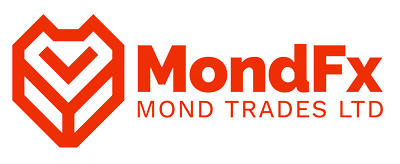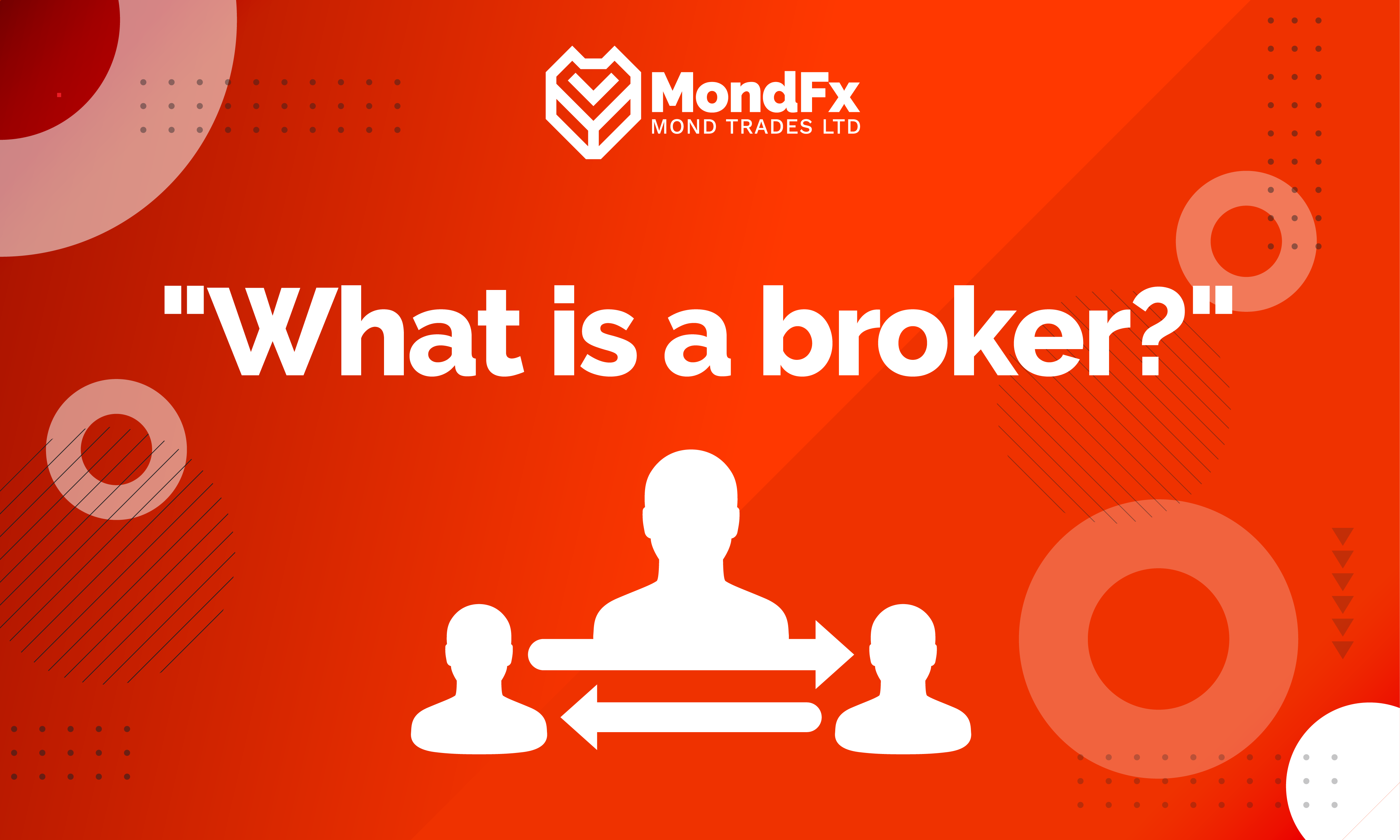Investors are always looking for ways to enter different markets and make profitable deals. This requires knowledge, experience and the right tools. In the meantime, the concept of broker plays a key role and as a reliable intermediary helps investors in achieving their financial goals.
A broker, in general, is a company that facilitates the buying and selling process by communicating between the parties in a particular financial market. There are different types of brokers, each of which operates in different financial markets. In this article, we will focus on the concept of forex broker, which plays a vital role in the foreign exchange market.
The main duties of a forex broker
Providing a trading platform: Brokers provide powerful online platforms to their clients. These platforms allow traders to view price charts, register currency purchase and sale orders, account management and monitor market developments.
Execution of transactions: The main task of a forex broker is to execute orders for buying and selling currency that are registered by customers. By communicating with other market players, the broker executes the orders in the best possible way.
Settlement of transactions: After execution of orders, the broker is responsible for settlement of funds. This includes transferring funds obtained of the sale of currency to the customer’s account and deducting the relevant fees.
Providing support services: reliable brokers provide comprehensive and professional support services to their customers. These services include answering questions, solving possible problems in the trading platform, and providing guidance regarding the trading process.
Advantages of using a forex broker:
Easy access to the market: Brokers facilitate access to the forex market for investors around the world by providing online platforms.
Efficiency and speed: the process of registering orders and executing transactions through broker platforms is done quickly and easily.
Variety of trading instruments: Many brokers provide their customers with the possibility of buying and selling a wide range of financial instruments, including different currency pairs, gold, oil and stocks.
Risk management: Some brokers provide clients with risk management tools and strategies that help reduce probable losses.

Important points in choosing a forex broker:
Considering the importance of the broker’s role in the success of transactions, choosing a reliable and efficient broker is of particular importance. When choosing a forex broker, pay attention to the following points:
Credibility and history of the broker: Before choosing a broker, check its activity history, credit and licenses, carefully.
Fees and expenses: Pay attention to the broker’s fees and transaction expenses structure and compare it with other brokers.
Trading Platform: Ensure the user-friendliness, features and tools available in the broker’s trading platform.
Customer Service: Check out the broker’s customer support service so that you can easily contact them if you need help or resolve probable issues.
Security: Ensure the credibility and security of the broker and its trading platform.
Forex broker, as a reliable intermediary, facilitates the process of entering the financial markets and making transactions for investors. By choosing the right broker and acquiring sufficient knowledge, you can benefit from investment opportunities in the forex market. Do not forget that investing in forex is associated with risk, and before entering this market, you must acquire sufficient knowledge and information.
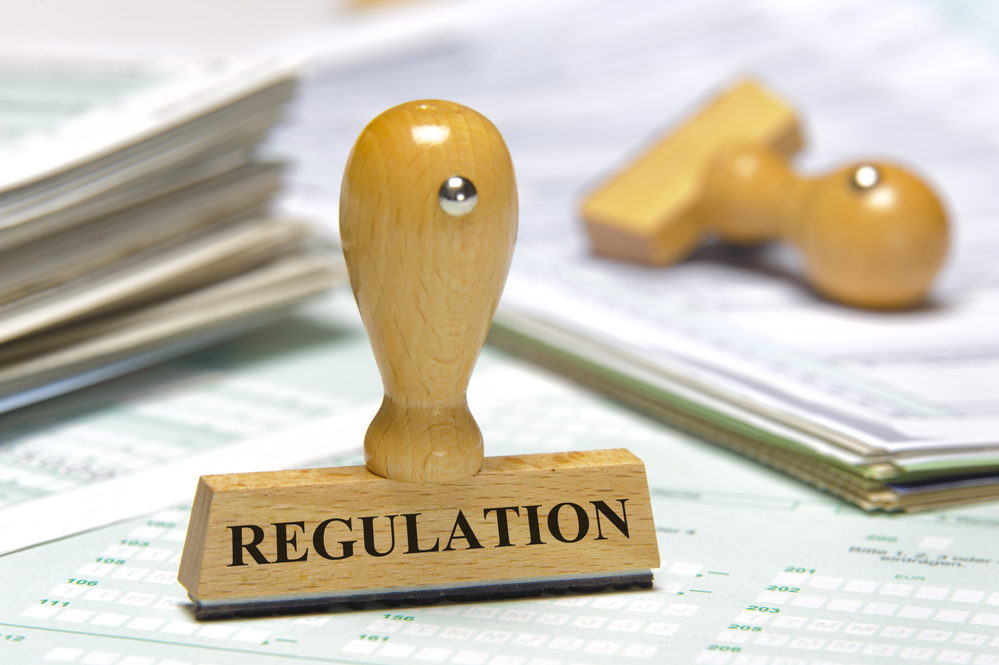
What does Regulated Broker mean?
One of the main elements in establishing security and confidence in this space is choosing a regulated broker. But what is a Regulated Broker and why is it particularly important to choose it? A regulated broker is a broker that operates under the supervision and control of reputable international or national financial institutions. These institutions establish specific rules and regulations for the activities of brokers and continuously monitor their performance.
Why is it important to choose a regulated broker?
Choosing a regulated broker brings many benefits to investors. Among these benefits, the following can be mentioned:
Security of capital: regulatory bodies, by establishing strict rules and regulations, protect investors’ capital against potential profit-seeking actions of brokers. Regulated brokers are required to comply with these rules and in case of violation, they will face serious penalties.
Transparency and trust: the activities of regulated brokers are carried out under the supervision of competent institutions. This issue helps to increase the transparency in the broker’s performance and create more trust for investors.
Legal protection: In case of any problem or dispute with the broker, investors can follow up through regulatory bodies and defend their legal rights.
Trading standards: Regulated brokers are required to comply with certain trading standards. This helps to create a fair and justly environment for transactions.
How to choose a regulated broker?
Choosing a suitable regulated broker requires careful consideration and attention to the following points:
Credibility of the supervisory body: Make sure that the regulatory body that oversees the broker’s activity is reputable and recognized.
Broker Licenses: Check that the broker in question has received a license from the relevant regulatory body.
History and reputation of the broker: Check the history of activity, reputation and credibility of the broker among investors.
Broker services and facilities: Adapt the services offered by the broker (such as a variety of trading platforms, analytical tools and support services) to your needs.
Fees and commissions: Carefully check the broker’s fee structure and transaction fees and compare it with other regulated brokers.
Choosing a regulated broker is an important step towards ensuring security and confidence in your financial activities. By choosing a reliable and supervised broker, you can enter the world of financial transactions with more ease and confidence and take advantage of the opportunities to earn profit. Don’t forget that investing in the financial markets is associated with risk, and before entering this field, you should acquire sufficient knowledge and information.

The role of broker in financial markets
In simpler terms, a brokerage is a bridge that connects investors and traders to the stock exchange or other financial markets.
But what exactly does a broker do? What is his role in the financial markets?
Execution of transactions: The main task of the broker is to execute the purchase and sale orders given to him by the customers. As an investor, you cannot directly enter the stock exchange and make a transaction. Rather, you must act through a broker. The broker receives your buy and sell orders and sends them to the market.
Market Access: As mentioned, direct access to some financial markets is not possible for the general public. Brokerages are licensed to operate in these markets and can trade in them on behalf of their clients.
Analysis and consultation: Many brokerages also provide financial analysis and consulting services. Brokerage analysts help clients to make appropriate investment decisions by examining market conditions and companies’ status. Of course, note that these consultations are suggestions and the final decision to invest is your responsibility.
Custody of assets: Brokerages can keep your securities and other financial assets safe. In this way, you will be relieved of losing or damaging documents related to your investments.
According to the mentioned cases, it can be said that brokerages play an important role in facilitating and efficient transactions in the financial markets. They help the flow of capital and economic prosperity by communicating between investors and the market.
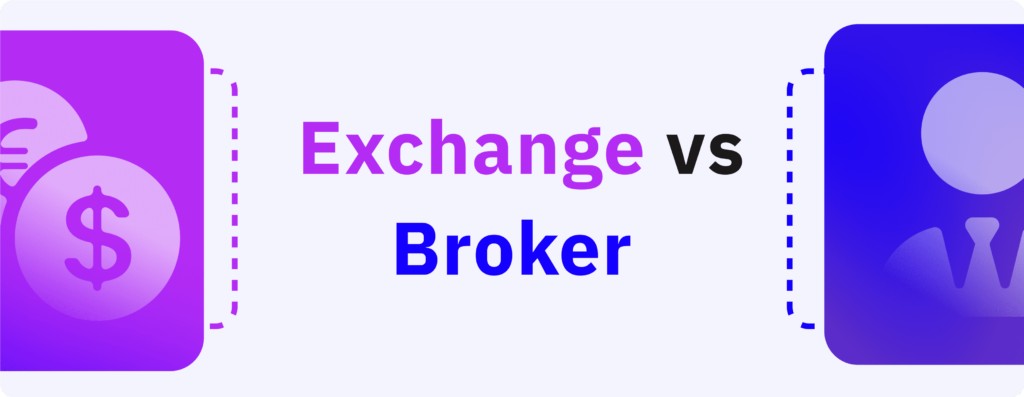
The difference between a broker and an exchange
Two terms that are often confused are broker and exchange.
Exchange:
An exchange is an institution that buys and sells foreign currencies.
Exchanges determine the parity rate of currencies and sell it to customers with a slight difference.
Exchange services mainly include currency conversion, buying and selling of banknotes and traveller’s cheque.
Exchanges deal with their customers in low volumes and in cash.
Broker:
A broker is an institution that, as an intermediary, provides the possibility of buying and selling securities such as stocks, bonds and commodities in the financial markets.
Brokers give their clients access to a wide range of financial instruments.
To make transactions in the financial markets, it is necessary to have a brokerage account.
Brokers charge fees from their clients.
Understanding the difference between a broker and an exchange is essential for entering the world of financial transactions and choosing the most suitable institution for financial affairs. Exchanges are a good option for low-volume foreign currency conversion, while brokers are used to invest in financial markets and trade securities and commodities.
Feature Exchange Broker
Asset type Foreign currencies Securities,Commodities
Transaction volume Low, Cash High, Cash, Credit
Market access Limited Direct
Presented Service Currency conversion, Securities transactions,
buying and selling currency market analysis,
financial consulting,
asset portfolio management
In Iran, the activity of exchanges is monitored and controlled by the central bank.
The activity of brokers in Iran is limited and some of them operate illegally.
Choosing the right broker for investing in the financial markets is very important and should be done by checking their records and licenses.
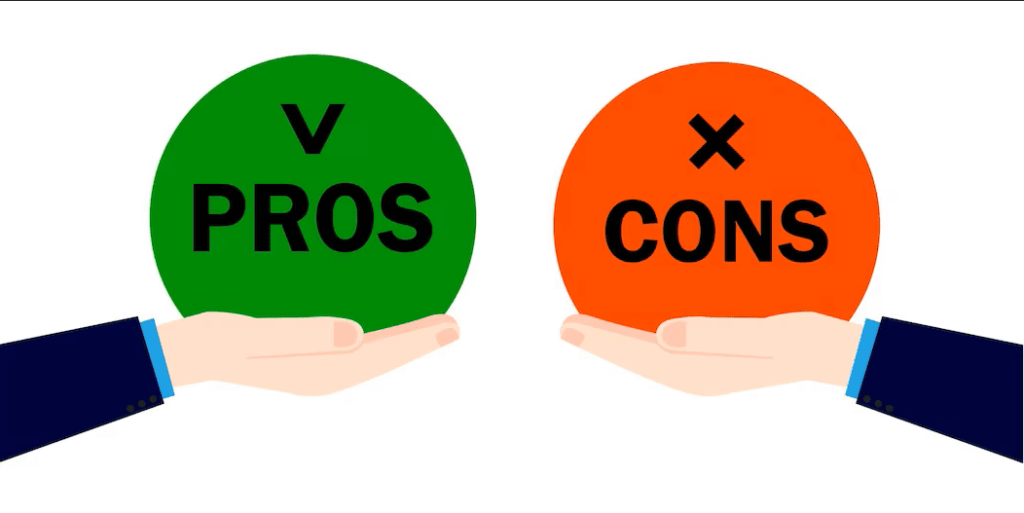
Advantages and disadvantages of using a broker
Using a broker can have many benefits for investors, but at the same time, it also comes with risks. Before using a broker, you should thoroughly research its pros and cons and also the risks involved in the financial markets.
Advantages of using a broker
Access to financial markets: Brokers allow you to invest in various financial markets around the world, without needing to be physically present in those markets.
Variety of trading instruments: Brokers offer you a wide range of trading instruments such as stocks, bonds, ETFs, CFDs and options.
Trading with leverage: Some brokers allow you to trade with more money than your account balance using leverage. This can increase your profits, but at the same time, it also increases the risk of trading significantly.
Market analysis and training: Many brokers offer their clients market analysis and training services that can help you make more informed decisions in your trades.
Online transactions: Brokers allow you to buy and sell securities online through their trading platforms.
Disadvantages of using a broker
Fees: Brokers charge you a fee for the services they provide. These fees can be fixed, a percentage of each transaction, or a combination of both.
Risk of fraud: Unfortunately, some brokers operate illegally and may commit fraud on their customers. For this reason, before choosing a broker, you should thoroughly research them and make sure they are licensed and reputable.
Transaction risk: Investing in financial markets is associated with risk and you may lose in your transactions. Using leverage also increases this risk significantly.
Complexity: Trading in financial markets can be complex and requires knowledge and experience. If you do not have enough knowledge in this field, you may have problems in choosing the right securities for investment and making profitable transactions.
Introduction of different types of brokers (forex, crypto currency,…)
There are different types of brokers, each specializing in certain financial markets. We introduce some of the most common types of brokers:
Forex broker (Foreign Exchange Broker): Forex refers to the foreign currencies exchange market. The forex broker allows you to invest in the fluctuations of different exchange rates.
Stock Broker: A stock broker allows you to buy and sell stocks of different companies.
Commodity Broker: A commodity broker allows you to invest in commodities such as oil, gold, or wheat.
Futures Broker: Futures are agreements to buy and sell certain assets in the future at a predetermined price. A futures broker allows you to invest in this market.
Options Broker: Options are contracts that give you the right, but not the obligation, to buy or sell a certain asset at a certain time at a certain price. The options broker allows you to invest in this market.
Cryptocurrency Broker: Cryptocurrency is a type of virtual money that is secured using cryptography. Crypto currency broker allows you to buy and sell different types of crypto currency.
When choosing a broker, it is important to consider various factors such as trading fees, tradable assets, the trading platform offered, and the reputation of the broker. Also, make sure that the broker you are looking for has a license to operate from a reputable authority.
Exchange Brokers
A trading broker is a financial intermediary that allows you to buy and sell various assets such as stocks, currencies, commodities or even cryptocurrencies. A broker is your bridge to the financial markets. You announce your buy and sell orders to the broker and the broker executes these orders in the market.
There are different types of brokers and each one offers specific features and services. But in general, the main duties of a broker are:
Receive and execute your trading orders
Providing a platform for transactions
Providing liquidity for transactions
Providing support services to customers
Why is choosing the right broker important?
Choosing the right broker is one of the most important decisions you make at the beginning of entering the financial markets. A good broker can dramatically improve your trading experience. Oppositely, choosing an unreliable broker can lead to financial losses.

OTC brokers
An important part of trading is done in the space called OTC (Over-The-Counter) market. The main players of this market are OTC brokers, which we intend to introduce to you in this blog.
What is the OTC market?
The OTC market is a decentralized market, in the sense that transactions take place directly between two parties (buyer and seller) and outside of a central trading board. This market includes a wide range of assets that cannot be traded in traditional stock exchanges. Some of these assets include:
Stocks of small and start-up companies: Growing companies that do not yet qualify for admission to the stock exchange can raise capital through the OTC market.
Low-Credit Fixed Income Bonds: Bonds of companies with higher credit risk are usually traded in the OTC market.
Derivatives: Futures contracts, options and swaps, which are custom designed and flexible, are often traded in the OTC market.
Specialty Commodities: Rare precious metals, gemstones, and certain agricultural products are examples of commodities traded in the OTC market.
The role of OTC brokers in the market
OTC brokers are financial intermediaries that enable communication between buyers and sellers in the over-the-counter market. They have important duties, including:
Finding counterparty: With a wide network of clients, brokers can find the right buyers and sellers for any asset in the OTC market.
Price negotiation: Due to the decentralized nature of the OTC market, asset pricing is determined based on negotiation between the parties with the help and expertise of the broker.
Transaction settlement guarantee: Brokers ensure that the settlement process (delivery of assets and receipt of funds) is done correctly and safely.
Providing analytical and advisory services: Some OTC brokers offer specialized research and advisory services on specific assets to their clients.
Advantages of using OTC brokers
The OTC market has several advantages over the stock market. Among these advantages, the following can be mentioned:
Access to a wider range of assets: As mentioned, the OTC market allows trading of assets that are not available on traditional exchanges.
Greater flexibility: Trading in the OTC market is more customizable and custom contracts can be set up based on the specific needs of the parties.
Faster trading speed: The trading process in the OTC market is usually faster than in the stock market because there is no need to comply with complex exchange requirements and regulations.
Important points in choosing an OTC broker
Due to the decentralized nature of the OTC market, choosing a reputable and reliable broker is particularly important. When choosing an OTC broker, pay attention to the following points:
License and accreditation of the broker: Make sure that the broker you are looking for has a license to operate from a reputable financial regulatory body.
History and reputation of the broker: check the activity history, reputation and credibility of the broker in the market.
Services and facilities offered: Compare broker services and facilities that suit your needs, including the range of tradable assets, trading platform and support services.
Costs and fees: It compares the amount of spread (difference between buying and selling price), transaction fees and other fees of the broker with other brokers.
P2P brokers
P2P broker stands for “Peer-to-Peer”. In this type of brokerage, unlike the traditional model, there is no longer a central intermediary. Instead, buyers and sellers communicate and transact directly with each other. This direct communication takes place through a secure platform under the supervision of a P2P broker.
Advantages of P2P brokers:
Greater transparency: In P2P brokers, all transaction steps are carried out transparently without the intervention of intermediaries. This transparency brings more trust and confidence for the parties to the transaction.
Lower costs: Eliminating the central intermediary in P2P brokers leads to lower transaction costs. Because there is no need to pay heavy fees to traditional brokers.
Access to a wider range of assets: Some P2P brokers allow the trading of a variety of assets, including crypto currencies, commodities and securities. This diversity is attractive for professional investors and those interested in different markets.
High security: P2P brokers’ platforms benefit from advanced security technologies that protect users’ assets. In addition, many of these platforms use user authentication systems to prevent unauthorized people from entering the network.
Disadvantages of P2P brokers:
Price volatility: Due to the decentralized nature and direct supply and demand in P2P brokers, there may be more price volatility than traditional brokers.
**Lower liquidity:** The volume of transactions in P2P brokers may be lower than traditional brokers. This issue can affect the speed of transactions.
More responsibility rests with the user: In P2P brokers, the user is responsible for evaluating the counterparty of the transaction and choosing a reliable person. This can be a bit challenging for novice users.
Are P2P brokers suitable for you?
P2P brokers are a good option for people who are looking for transparent, low-cost and highly flexible transactions. Also, investors seeking access to a wide range of digital assets and other markets can benefit from the services of P2P brokers. However, for novice users looking for more guidance and support from the broker, the traditional model will be more efficient.
Important considerations in choosing a P2P broker
Platform credibility and security: Before choosing any P2P broker, be sure to research the platform’s credibility and security. Make sure the platform uses the latest security technologies and has a positive track record of protecting users’ assets.
Fees and costs: The structure of fees and transaction costs is different in P2P brokers. Be sure to compare the different fees carefully before registering to choose the best option.
Tradable Currencies: Make sure your P2P broker supports the cryptocurrencies or assets you plan to trade.
Distributor brokers (Broker-Dealers)
These brokers act as professional intermediaries between buyers and sellers of securities, currencies, commodities or even cryptocurrencies and play a vital role in facilitating transactions and maintaining market liquidity.
Duties and functions of distributor brokers
Providing liquidity: Distributor brokers create the necessary liquidity in the market by committing to buy and sell securities, currency and other assets. This, in turn, helps to make transactions smoother and reduce price fluctuations.
Transactions: Brokers, on behalf of their clients, execute buy and sell orders for securities and other assets in the market. They communicate directly with the market through advanced trading platforms and search for the best prices for their clients.
Providing consulting services: many distributing brokers also provide financial and investment consulting services to their customers. Analysts and specialists of these brokers, by examining market conditions and various securities, help customers choose the best investment options.
Provision of trading tools: Distributing brokers provide advanced trading platforms and various analytical tools to their clients. These tools help investors to trade in the market with more awareness and knowledge.
Types of distributor brokers:
Distributor brokers can be divided into different categories based on the type of activity and services provided. Some of the most common types of these brokers are:
Retail brokers: These brokers deal mainly with retail investors and real people.
Institutional trading brokers: These brokers deal with large financial institutions, investment funds and other legal entities.
Market management brokers: These brokers are actively present in the market and by committing to buy and sell certain securities, they help maintain the liquidity and price stability of those securities.
International trading brokers: These brokers provide their customers with the possibility of trading in different financial markets around the world.
Advantages of using distributor brokers:
Access to financial markets: Brokers allow you to trade in various markets that you may not be able to access them, directly.
Conducting transactions at the best price: Brokers, with their expertise and experience, can offer you the best prices for buying and selling securities and other assets.
Consulting and support services: Many brokers also offer consulting and support services that can help you choose the best investment options.
Use of advanced trading tools: Brokers provide you with advanced trading platforms and various analytical tools that help you make more informed trades.
Dealing Desk broker
Dealing Desk brokers and Non-Dealing Desk brokers. Desk brokers are the more traditional type of brokers and act as intermediaries between traders and the market. In this type of broker, the broker himself is the opposite party of your transaction and buys and sells securities, currency or other assets to you at the prices determined by him.
Advantages of trading desk brokers:
Guaranteed liquidity: One of the most important advantages of trading desk brokers is guaranteed liquidity. This means that you can buy or sell securities and other assets from the broker at any time and with any volume you wish. This is very important for traders who are looking for fast and hassle-free trading.
Low Minimum Deposit Trading Accounts: Many desk brokers offer low minimum deposit trading accounts. This topic is suitable for novice traders who want to enter the market with little capital.
User-friendly trading platforms: Trading desk brokers usually offer user-friendly and easy trading platforms for their clients. These platforms allow you to easily place orders, analyze charts and use various trading tools.
Training and support services: Many trading desk brokers also offer training and support services to their customers. These services can help you learn how to trade and choose the best trading strategies.
Disadvantages of trading desk brokers
More spread: In general, the spread (the difference between the buying and selling price) is more in trading desk brokers than brokers without a trading desk. This can reduce your profit per trade.
Lack of transparency: In trading desk brokers, you do not know at what price the broker buys securities and other assets from the market and sells them to you. This issue can cause doubts about the transparency of transactions.
Inability to use algorithmic trading: some brokers do not allow you to use algorithmic trading or automated trading. This can be limiting for professional traders who use complex trading strategies.
Is a trading desk broker suitable for you?
Desk brokers are a good option for traders looking for guaranteed liquidity, trading accounts with low minimum deposits and user-friendly trading platforms.
However, if you’re looking for lower spreads, more transparency, and the ability to use algorithmic trading, no dealing desk brokers may be more suitable for you.
Tips for choosing a trading desk broker:
Spreads and Fees: Check the broker’s spread and fees carefully and make sure it fits your situation.
Minimum Deposit: Check the minimum deposit required to open a trading account.
Trading Platform: Check the broker’s trading platform for usability and features.
Training and Support Services: Check out the training and support services provided by the broker.
Licensing and Accreditation: Make sure the broker you are looking for is licensed by a reputable regulatory body.
No Dealing Desk Broker: Direct and transparent transactions in the market
In the world of financial transactions, there are two main types of brokers: Dealing Desk brokers and Non-Dealing Desk brokers. Unlike trading desk brokers where the broker is the other side of your transaction, in non-dealing desk brokers, you deal directly with other traders in the market. In this type of broker, the broker acts only as an intermediary and sends your buy and sell orders directly to the market.
Advantages of non-dealing desk brokers:
Less spread: In general, the spread (the difference between the buying and selling price) in non-dealing desk brokers is less than that of trading desk brokers. This can increase your profit from each trade.
More transparency: At non-dealing desk brokers, you can see the prices that other traders in the market are offering for securities and other assets. This will help you make a more informed buying and selling decision.
Possibility of algorithmic trading: Many non-dealing desk brokers allow you to use algorithmic trading or automated trading. This can be useful for professional traders who use complex trading strategies.
Access to a wider range of markets: Some non-dealing desk brokers allow you to trade in a wider range of markets including forex, crypto currencies, commodities and securities.
Disadvantages of non-dealing desk brokers:
Less Liquidity: Liquidity in non-dealing desk brokers may not be as guaranteed as in dealing desk brokers. This could mean finding a counterparty to trade in high volumes or in specific market conditions.
Trading accounts with high minimum deposits: Many non-dealing desk brokers offer trading accounts with high minimum deposits. This can be challenging for novice traders who want to enter the market with little capital.
More complex trading platforms: The trading platforms of non-dealing desk brokers may be more complex to use than those of desk brokers.
Limited training and support services: Some non-dealing desk brokers offer limited training and support services to their clients.
Is a non-dealing desk broker suitable for you?
Non-dealing desk brokers are a good option for traders who are looking for lower spreads, more transparency, the possibility of using algorithmic trading and access to a wider range of markets.
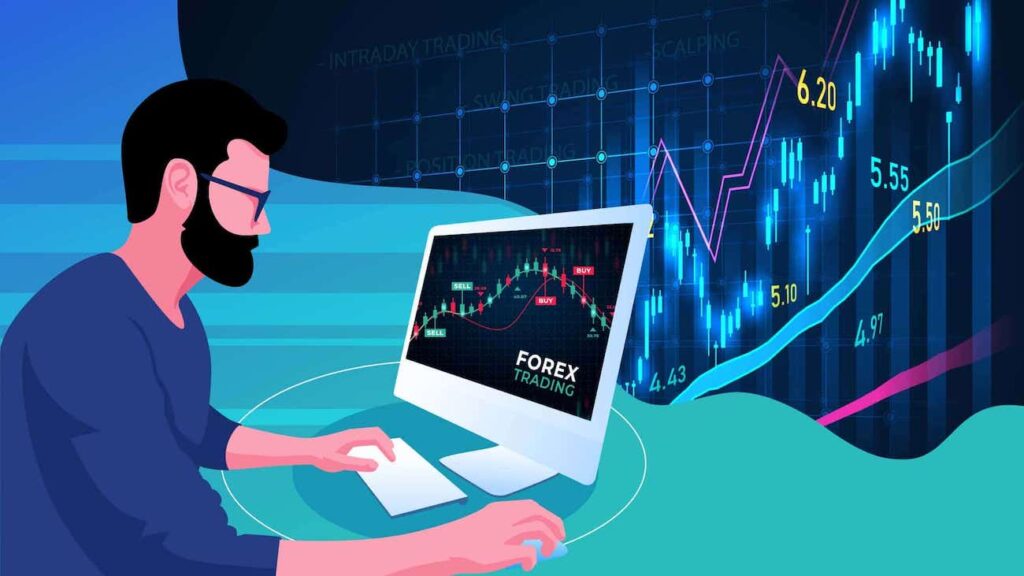
STP broker
The variety of brokers and the services they offer can be confusing. Among the different types of brokers, “STP brokers” or “Straight Through Processing” have attracted the attention of many traders because of the unique benefits they offer.
STP stands for “Straight Through Processing”. In this type of brokers, your buy and sell orders are sent and executed directly to the market without the intervention of any intermediaries. This has several advantages for traders:
Transparency of transactions: In STP brokers, you can directly see the prices in the market for buying and selling securities, currency or other assets. This transparency helps you to trade with more knowledge and confidence.
Spread reduction: Due to the elimination of middlemen in STP brokers, the spread (the difference between buying and selling prices) is significantly reduced. This is in your favor as you will get more profit from each trade.
High speed in execution of transactions: your orders in STP brokers are sent directly to the market and do not need to be confirmed by traders or the broker’s trading desk. This will make your transactions run at a high speed and make full use of trading opportunities.
Access to a wider range of markets: Many STP brokers allow you to trade in a wider range of markets including forex, crypto currencies, commodities and securities.
Disadvantages of STP brokers:
Liquidity: Liquidity in STP brokers may not be as high as in ECN (Electronic Communication Networks) brokers. This could mean finding a counterparty to trade in high volumes or in specific market conditions.
High minimum deposit trading accounts: Many STP brokers offer high minimum deposit trading accounts. This can be challenging for novice traders who want to enter the market with little capital.
More complex trading platforms: The trading platforms of STP brokers may be more complicated to use than some brokers.
Is STP broker suitable for you?
STP brokers are a suitable option for traders who are looking for transparency, low spread, high speed of trading and access to a wider range of markets.
However, if you are looking for guaranteed liquidity, trading accounts with low minimum deposits and user-friendly trading platforms, other types of brokers such as Dealing Desk brokers may be more suitable for you.
ECN Broker: Experience direct trading in financial markets
Among the different types of brokers, “ECN brokers” or “Electronic Communication Network” have attracted the attention of many professional and experienced traders due to the unique benefits they offer.
ECN stands for “Electronic Communication Network” which means electronic trading network. In this type of brokers, unlike traditional brokers that act as intermediaries between traders and the market, you trade directly with other traders around the world. This brings you several benefits:
Unparalleled transparency: In ECN brokers, you can instantly see the bid and ask prices offered by other traders for buying and selling securities, currency or other assets. This unique transparency helps you choose the best price for your transactions with full knowledge and confidence.
Significant reduction of spread: Due to the elimination of intermediaries in ECN brokers, the spread (the difference between buying and selling prices) is significantly reduced. This will increase your profit from each trade and will benefit you.
Access to deep market liquidity: ECN brokers allow you to access the deep liquidity of financial markets around the world. This means finding the counterparty for transactions in high volumes and in different market conditions.
Algorithmic trading and complex strategies: ECN brokers allow you to fully utilize algorithmic trading and complex trading strategies. This is very important for professional traders who use advanced tools to analyze the market and make trading decisions.
Disadvantages of ECN brokers:
Need for specialized knowledge and skills: Trading in ECN brokers requires specialized knowledge and skills in the field of online transactions due to greater transparency and complexity.
High minimum deposit trading accounts: Many ECN brokers offer high minimum deposit trading accounts. This can be challenging for novice traders who want to enter the market with little capital.
Variable fees: Trading fees in ECN brokers are variably calculated based on the volume of your transactions. This can be costly for high volume traders.
Is ECN broker suitable for you?
ECN brokers are a good option for professional and experienced traders who are looking for absolute transparency, low spreads, access to deep market liquidity and the possibility of using algorithmic trading.
However, if you are a novice trader and are looking for a broker with easy to use, low minimum deposit and fixed fees, other types of brokers such as Dealing Desk or STP brokers may be more suitable for you.
MTF broker
MTF stands for “Multilateral Trading Facility” which means multilateral market. These types of brokers provide a trading platform where buyers and sellers of securities, currency or other assets can directly trade with each other. MTF brokers actually play an intermediary role that helps facilitate these transactions and create a transparent and efficient market.
Advantages of MTF brokers:
Transparency and competition: In MTF brokers, all buy and sell orders are publicly available to all traders. This helps create transparency and competition in the market and benefits traders as they can find the best price for their trades.
Access to a wider range of assets: MTF brokers usually offer a wider range of assets to trade compared to other types of brokers. This allows you to create your investment portfolio in a more diversified manner and according to your needs and strategies.
Flexibility in trading: MTF brokers allow you to place different types of trading orders including limit orders, market orders and stop orders. This flexibility helps you execute your trading strategies more accurately.
Competitive Trading Fees: MTF brokers generally offer competitive and low trading fees. This is in your favor as you will get more profit from your trades.
Disadvantages of MTF brokers:
Liquidity: Liquidity in some MTF brokers may not be as high as ECN brokers. This could mean finding a counterparty to trade in high volumes or in specific market conditions.
Need for knowledge and skills: trading in MTF brokers requires high knowledge and skills due to greater transparency and complexity.
Trading Platforms: The trading platforms of MTF brokers may be more complicated to use than some brokers.
Is the MTF broker suitable for you?
MTF brokers are a good option for experienced traders who are looking for transparency, competition, access to a wider range of assets, flexibility in trading and competitive trading fees.
However, if you are a novice trader looking for a broker with easy to use, low minimum deposit and guaranteed liquidity, other types of brokers such as Dealing Desk or STP brokers may be more suitable for you.
Choosing and working with MondFX broker
MondFX is an online forex broker founded in 2024. This broker is based in Dubai and is regulated and licensed by the Financial Services Commission of the Central Bank of England. MondFX offers a wide range of trading accounts, trading platforms and trading tools to clients worldwide.
Things to consider before choosing MondFX as your broker:
Licensing and Regulation: MondFX is regulated and licensed by the SVGFSC. This license shows the broker’s commitment to comply with regulatory standards and protect customers. However, remember that a license does not necessarily mean the best service or the lowest risk.
Trading Accounts: MondFX offers a wide range of trading accounts with different minimum deposits. The type of account you choose depends on your needs and trading experience.
Trading platforms: MondFX uses the MetaTrader 5 trading platform. These platforms are known for their extensive capabilities and analytical tools.
Trading Tools: MondFX offers a wide range of trading tools such as technical indicators, charts and news. These tools can help you analyze the market and make informed trading decisions.
Fees and Spreads: MondFX offers competitive spreads and trading fees. However, be sure to check the spreads and fees for the currency pairs and CFDs you intend to trade before opening an account.
Customer Service: MondFX offers 24/5 customer service via live chat, email and phone.
Security: MondFX uses various security measures to protect its customers’ information and funds.
Opinions and experiences of other traders: Before choosing MondFX, read the opinions and experiences of other traders about this broker.
How to work with MondFX:
- Open a trading account: To open a trading account on MondFX, you need to go to the website and complete the registration form.
- Fund your account: After opening an account, you must fund it by depositing funds through one of the payment methods supported by the broker.
- Download and install trading platform: MondFX offers MetaTrader 4 and MetaTrader 5 trading platforms. You can download and install these platforms for free from the broker’s website.
- Start trading: After funding your account and installing the trading platform, you can start trading Forex and CFDs.
Steps to start trading in Forex
- Choosing a reliable broker: The first step to start trading in forex is to choose a reliable broker. A broker is an intermediary that allows you to trade in the forex market. When choosing a broker, pay attention to the following:
Licensing and Regulation: Make sure the broker is licensed to operate from a reputable regulatory body such as the FCA, CySEC or ASIC.
Trading Accounts: Check out the variety of trading accounts offered by the broker and choose the account that suits your needs and experience level.
Trading Platforms: Check the trading platforms offered by the broker and make sure you have got a familiar use with them.
Spreads and Fees: Check the broker’s spreads and trading fees carefully.
Customer Service: Check the customer service provided by the broker and make sure that you can easily contact them if you need help.
- Account opening and authentication: After choosing a broker, you need to open a trading account. For this, you must complete the registration form on the broker’s website and provide your identity documents. The authentication process is necessary to verify your identity and prevent illegal activities.
- Installing trading software: Most brokers offer trading platforms that you can install on your computer, tablet or smartphone. The trading platform allows you to view charts, place buy and sell orders and manage your account.
- Deposit: To start trading, you need to deposit funds into your trading account. Brokers support various payment methods such as credit cards, e-wallet and bank transfer.
- Choosing a trading strategy: Before starting trading, you should choose a suitable trading strategy. A trading strategy helps you decide when and how to trade.
- Risk management: Trading in forex is associated with risk. To protect your capital, you should use risk management principles such as using stop loss and stop profit.
- Learning and training: To become a successful trader, you must be constantly learning and training. There are various educational resources available to you such as books, articles, websites and online courses.
How the broker works
A broker is an intermediary that allows you to trade in the forex market. Brokers are divided into two main categories:
Dealing Desk Brokers: In this type of brokers, your transactions are done directly with the broker. Brokers usually offer fixed spreads for trades.
ECN (Electronic Trading Network) brokers: In these types of brokers, your transactions are done directly with other traders in the market. ECN brokers usually offer a variable spread that depends on your trading volume.
Deposit and withdrawal
Brokers support different payment methods for depositing and withdrawing money from your trading account. Common methods include credit cards, e-wallets, and bank transfers.
common questions
- What is a forex broker?
A forex broker is a company that acts as an intermediary between buyers and sellers of currency in the forex market. Brokers contribute to the prosperity and transparency of the forex market by providing a trading platform and supporting transactions.
- What services are provided by the forex broker?
The main services of the forex broker include the following:
Providing a trading platform
Execution and settlement of transactions
Provide support services
Providing educational services and market analysis (in some brokers)
- How to register in a forex broker?
To register in Forex broker, you must go to the desired broker’s website and complete the registration form. In this form, information such as name, surname, email address, phone number and identity documents are requested from you.
- What points should be considered in choosing a forex broker?
The most important points to consider when choosing a forex broker are:
Credibility and history of the broker
Fees and Charges
Trading platform
Customer services
Security
- Is investing in forex associated with risk?
Yes, investing in the forex market is associated with risk. Exchange rate fluctuations can lead to your profit or loss. Therefore, before entering this market, you should acquire enough knowledge and information and invest only the amount you can afford to lose.
In addition to these 5 frequently asked questions, there are other items that may be a question for beginner traders. for example:
What are the types of trading accounts in brokers?
What is the minimum capital required to start trading in forex?
What analytical tools are offered in trading platforms?
How to use different trading strategies?
If a problem occurs, how can you contact the broker’s support?
Traders can get answers to their questions about these and other topics related to forex trading by visiting the website or contacting the broker’s support department.
Last word
The forex market, as the world’s largest financial market, is a platform for exchanging different currencies in a decentralized manner. In this dynamic market, traders seek to make profits by predicting exchange rate fluctuations. Meanwhile, forex brokers play a key role in facilitating transactions and providing services to traders. A forex broker acts as an intermediary between buyers and sellers of currency and helps the prosperity and transparency of the forex market by providing a trading platform and supporting transactions.
The main duties of a forex broker:
Providing a trading platform: Brokers offer different trading platforms to their clients that allow them to buy and sell currencies, analyze price charts and manage transactions.
Execution and settlement of transactions: after receiving the order from the client, brokers execute it in the market and settle the transaction amount between the parties.
Providing support services: Brokers are obliged to answer customers’ questions and doubts about transactions and the trading platform and guide them in case of problems.
Registering in a reliable and efficient forex broker is the first step to entering this market and making successful transactions. Due to the variety of brokers and the provision of different services by them, choosing the right broker is of particular importance.
Points to consider when choosing a forex broker:
Credibility and history of the broker: Before choosing a broker, carefully check its activity history, credit and licenses.
Fees and expenses: Pay attention to the broker’s fees and transaction fees structure and compare it with other brokers.
Trading Platform: Ensure the user-friendliness, features and tools available in the broker’s trading platform.
Customer Service: Check out the broker’s customer support service so that you can easily contact them if you need help or resolve potential issues.
Security: Ensure the credibility and security of the broker and its trading platform.
In this article, we tried to introduce you to the concept of a forex broker, its main tasks and the points that you should pay attention to when choosing the right broker. Choosing a reliable and efficient broker will play a key role in the success of your transactions in the forex market.
